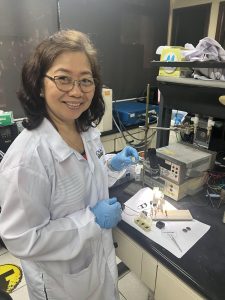Philippines

Related Research:
Our research focuses on developing sustainable fabric-based electrode materials for supercapacitor devices, addressing energy challenges in the Philippines and global trends towards renewable energy. Supercapacitors excel in quick energy storage and release, complementing batteries for short-term power needs without degrading battery life. Our project innovatively utilizes fabric substrates enhanced with biochar derived from agricultural wastes and conducting polymers such as polypyrrole and polyaniline. These materials offer lightweight, flexible, and sustainable alternatives to conventional electrodes. Indigenous natural fibers like abaca, banana, pineapple, and water hyacinth blended with cotton serve as the base for our electrodes. These fibers provide a rough surface and high surface area, ideal for electrode functionality, while promoting biodegradability and supporting local industry development. Additionally, our use of biochar from agricultural residues like rice straw and coconut husks highlights our commitment to sustainability. Biochar’s porous structure and high surface area enhance electrode performance while reducing agricultural waste. We have developed three prototype fabric supercapacitors—pouchtype, rigid-type, and coin cell—suitable for various applications including solar energy storage. These prototypes demonstrate the feasibility of integrating renewable energy sources with supercapacitor technology, enhancing overall energy efficiency and battery lifespan preservation. Our research contributes to advancing sustainable energy solutions tailored to local contexts, promoting economic development through innovative use of indigenous materials, and reducing environmental impact through biomass utilization.
Relation to Climate Resilience and Adaptation Theme:
Our research on sustainable fabric-based electrode materials for supercapacitors directly contributes to the theme of climate resilience and adaptation. By focusing on renewable energy storage solutions, we facilitate the integration of intermittent energy sources such as solar power into the grid. This capability is essential for enhancing climate resilience by reducing reliance on fossil fuels and mitigating the impacts of energy fluctuations caused by climate change. One of the fabrics we utilized was water hyacinth, an invasive plant species that proliferates in water bodies, contributing to pollution and ecological imbalance. By repurposing water hyacinth fibers into electrode materials for supercapacitors, we not only mitigate its environmental impact but also derive value from this problematic biomass. These fabric-based electrodes, enriched with biochar from agricultural waste and conducting polymers, offer lightweight, flexible, and sustainable solutions. They provide a dual benefit: advancing energy storage technology while actively contributing to environmental conservation and efforts to mitigate water pollution. Our approach underscores the importance of sustainable resource utilization in combating climate change and promoting adaptation strategies. By highlighting the transformation of fabrics into useful materials for renewable energy storage, our research aligns with global initiatives for climate resilience and adaptation, demonstrating tangible contributions to environmental sustainability and enhancing community resilience against climate impacts.
Affiliated Organisation:
UNIVERSITY OF SANTO TOMAS MANILA, PHILIPPINES
